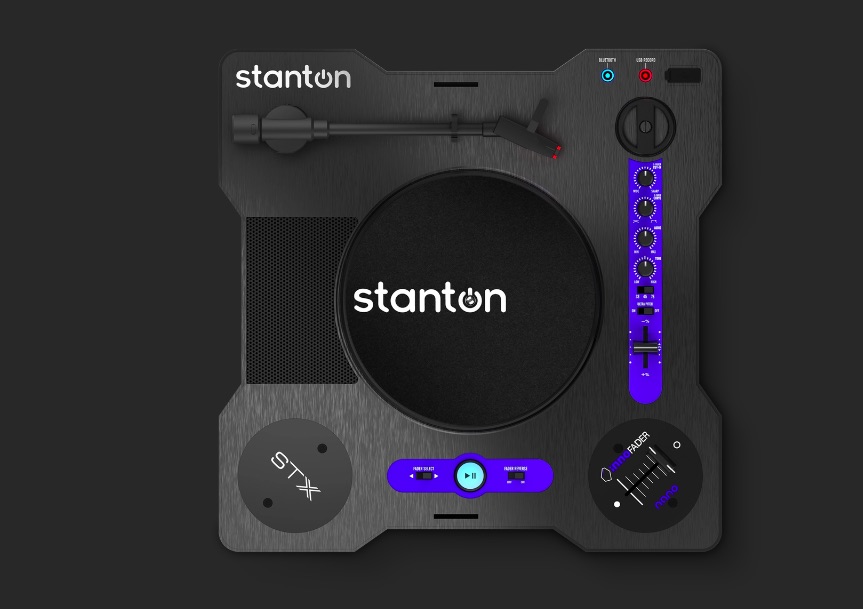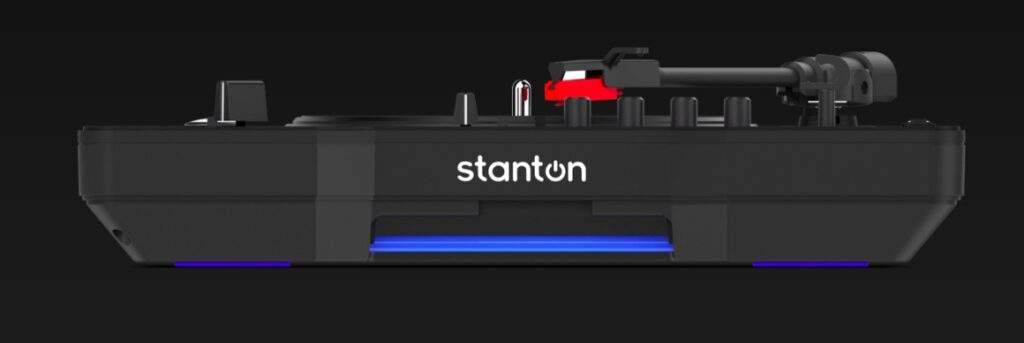A classic audio brand returns with a very modern take on a scratch turntable. Greg Scarth finds out why this portable deck should be taken seriously.

Founded in 1946 in New Jersey, Stanton is one of the oldest audio brands around, best known for turntables and cartridges, with the iconic 500-series cartridges arguably being the most popular of all. The Stanton name has been quiet in recent years, with a few takeovers and changes behind the scenes. The new Stanton STX marks the return of the brand, and it’s a much more adventurous release than you might expect. The STX is a portable scratch turntable, designed to play 7-inch records and with a distinct focus on scratching. There are superficial similarities between the STX and the PT01 portable turntable produced by Stanton’s inMusic sister brand Numark, but the PT01 is much cheaper and more basic. The STX aims to appeal to serious DJs and crate diggers as a rival to the Reloop Spin or the more expensive Omni by the Chinese brand Headache Sound.
To those unfamiliar with the niche world of portablism (as portable turntablism has become known), the setup here is quite logical once you figure it out, but it takes a moment to get your head around. Essentially you’re looking at a lightweight, battery-powered turntable with a built-in speaker, but also quite a few features you’d normally associate with DJ mixers; most notably, you’ve got a crossfader to cut the sound from the stylus, plus tone control and crossfader controls. In addition to the built-in speaker, you’ve got a surprisingly comprehensive range of inputs and outputs, with the ability to stream backing tracks from Bluetooth sources or an aux input, which are blended together with the output from the record. In addition to the built-in speaker, you can listen using headphones, record directly to a USB stick or take the stereo output from line outs (no phono pre-amp or mixer required; the STX has a built-in pre-amp and sends out a line-level stereo signal).

Opening the box, the STX is a lightweight unit with a clever lid which doubles up as a stand for the turntable when removed. There aren’t many accessories in the box, just a USB cable, a pair of rechargeable batteries and a slipmat, plus a 45 adapter mounted on the plinth. The STX runs on rechargeable lithium-ion batteries, of which two are included but only one actually used to power the turntable. The second battery fits into a slot alongside the first, acting as a spare to extend play time. Setup is easy, a simple case of inserting the batteries, mounting the slipmat and switching on to get started. There’s a selector switch for 33/45/78 RPM but you’d assume that’ll be left in the middle position most of the time as the most obvious use for the STX is playing 45s. The pitch fader is short and slightly fiddly in its standard ±8% setting (even more so when set to the ±50% ‘ultra pitch’ mode), but still probably more precise than the rotary pitch controls typically found on other portable turntables. All the basics are present and correct, but it’s the performance details which make or break this kind of design. Luckily, the STX lives up to expectations.

With those basics all present, the big selling point of the STX is the inclusion of a Mini Innofader Nano, a tiny version of one of the best crossfaders on the market. As with most portable turntables, the fader can be removed from its default location in the bottom-right corner of the plinth and moved to the bottom-left position, meaning that you can scratch with your left or right hand and use the crossfader with the other, whichever you prefer. The crossfader is angled differently depending on which side you mount it, encouraging you to rotate the turntable slightly and scratch the record at an angle, giving you slightly more room around the tonearm and cartridge. In practice, the ergonomics feel slightly better if you scratch with your left hand and cut the fader with your right, but there’s not much in it. Aside from the decent sound quality and precise, lightweight crossfader action, what’s impressive about the STX is the level of customisation; you can adjust the crossfader curve and precisely set the cut-in point as well as reversing the action, giving you full control over the way you cut the output of the cartridge. With reasonable power from the belt-driven platter, cutting and scratching is surprisingly effective for such a small turntable, with that Innofader offering great feel and precision.

By definition, the perfect portable turntable probably doesn’t exist. Making a deck portable inevitably involves compromises in terms of platter weight and motor power, but the STX strikes a good balance between portability, features and sheer fun. You can see where compromises have been made to keep the unit compact and affordable – the very short pitch fader, the plastic construction, and so on – but overall the package is impressive. The conventional portablism approach – if you can say that about a fairly unconventional scene – is to use one portable turntable to scratch along to a pre-recorded backing track. But there are other ways to use a turntable like the STX. The portability alone lends itself to crate digging for 45s, but there are other performance options too. There’s no reason you can’t hook two STXs up into a DJ mixer and perform two-deck routines. Why not grab some 7-inch Serato control vinyl and use one or more STXs as part of a quirky DVS setup? Portablists tend to embrace experimentation, and it’s popular to modify portable turntables, but the STX has a lot of the common mods covered as standard. Whether you want a fun, portable deck to mess about with or a more serious performance tool, the STX offers great value, decent sound and a more comprehensive feature set than its rivals. An impressive return for an iconic brand.
Greg Scarth
More info/buy